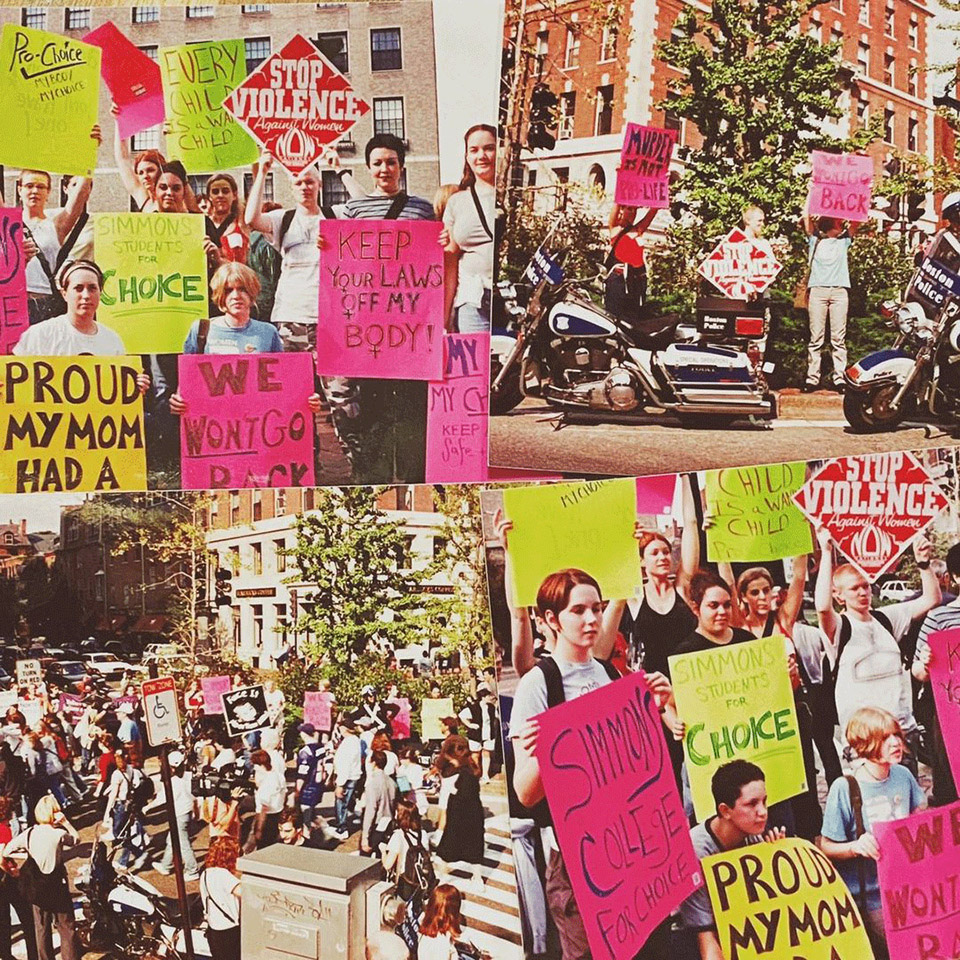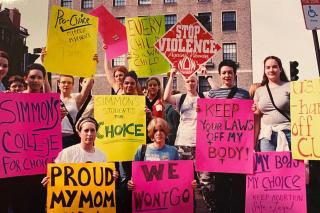Tell us about this photo!
I went to Simmons for my undergraduate and master's degree in gender and cultural studies. At Simmons I was part of the Feminist Union, and we went to a pro-choice rally, probably in 2000. We certainly didn't think Roe was going to be overturned but we thought some of our pro-choice liberties were going to be infringed upon. Looking back, I see that we had a very white feminist agenda, focused on abortion as our main issue. You'll notice there aren't many women of color in that photo — we were just a slice of the Simmons community, and we missed out on all kinds of collaborations by not broadening our horizons.
What activism were you involved in while at Simmons?
While at Simmons, I volunteered for NARAL Pro-Choice America, doing a research study and grassroots organizing. I was also involved in the LGBTQ organization Pride Alliance and worked on a national hotline for queer and trans people. The undergraduate program had a capstone, and you could do either an academic essay on a topic or volunteer for an activist project in the community, with the goal of making life better for women. The value of being on the ground was built into the curriculum.
As a student of gender and cultural studies, we were taught that it's important to expand your mind and learn the academics, but they mean nothing if you aren't getting your hands dirty, using your power and privilege to help others. A tenet of Judaism is, how much justice have you brought into the world? A lot of the feminists I knew in Boston were Jewish, as were the first anti-racists I knew. We believe, "the grandchildren of the world are my grandchildren," and if there are any kids who don't have the same opportunities, then that is my concern, too.
Tell us about the work you do.

I founded the American Association of Corporate Gender Strategists, the first professional organization for making workplaces better for women. We share research, best practices, and allow a safe space for consultants in this field to blow off steam.
As a consultant, I am Silicon Valley's gender and inclusion advisor. I look at companies and look at how to advance + support women at all tiers of those companies. Compared to men, women are denied promotions from the very first step on the corporate ladder, where there are more people of color and women of color. For every 100 men who are given the opportunity to move up to their first managerial position, only 70 women are given that chance. It's about intersectionality + race too: by the time you reach the C-suite, most of the women who managed to get there are white.
I partner with Silicon Valley startups to give them roadmaps to make their workplace better for those who are overlooked or under-represented based on race, gender, and/or orientation. Most of the startups are started by straight, white men, because it's so much harder for the rest of us to get funding, especially Black women. White men often hire other white men they know, which snowballs very quickly. I prefer to help startups when they are still small, to teach them how to get diversity right from nearly the start. At that stage, they are hiring quickly so with a few small tweaks you can enhance the diversity. I offer a keynote talk about why diversity is important and why a broader set of gender and orientations in the room is better for your product and your business.
My clients find me when I'm contacted by an internal employee who loves the company and sees potential, but can see that they are missing some things in the diversity landscape. They may have seen me at a conference or heard me on a podcast. I've talked to so many amazing feminists in the tech field! That said, I'm not interested in performative clean-up work, where companies sometimes bring someone in after there is a legal crisis or public relations problem. I find that those companies don't want to change, they just want to go back to selling their product.
How did Simmons prepare you for this work?
My peers and I in women's studies had so many professors focused on race and the experiences of womanhood across all racial lines and for all different groups of women. They enabled my transition from clueless white person to a white person who tries to include race in all of her work. Professors taught us how important it was to be an antiracist, and we learned how to use our white privilege to better the world. I thank Simmons for my smoother and earlier transition to being an antiracist. Meaning: I Thank my lucky stars that I wasn't one of those white people who woke up in 2020 to realize there was a race problem in this country.
Any advice for students wanting to get involved today?
Start before you are ready. Start before you are an expert. Go and see people who are already doing good work, especially people who are more marginalized than you, and see what they are up to, what their needs are, and how you can engage and be of service in an organization that is already running. I also run a program to address this issue: Future Thought Leaders is an accelerator for feminists and queer/trans people who want to change something in the world (or in their workplace).

People's hearts and minds get changed by people they know. Start changing the hearts and minds of your inner circle: people in your religious institution, community center, neighborhood, Thanksgiving table. Gallup polls show that the majority of people are fine with women taking control of their own reproductive choices, but those who are against it have really loud voices and get a lot of press, they are very visible. Focus on people who are warm to change, otherwise you will wear yourself out. You don't have to change your angry bigoted uncle's opinion, but there are so many other people who are open to change and just need one non-judgemental conversation.

